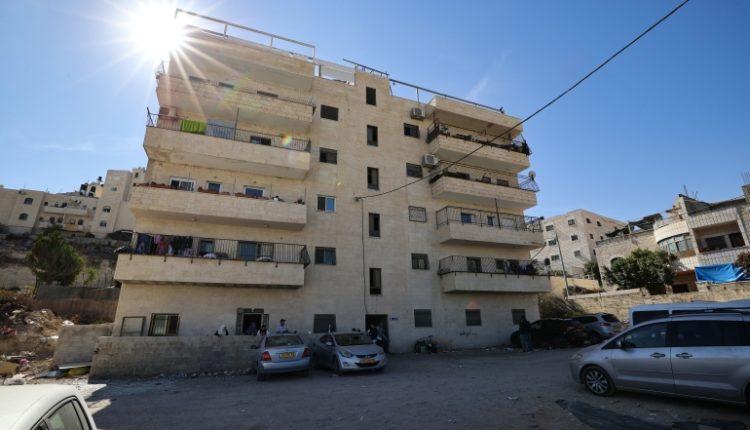Some 70 Palestinians, about half of whom are children, are at risk of forced displacement in the Jerusalem neighbourhood of al-Tur as they await an Israeli court decision over the fate of their five-storey residential building.
Israeli occupation authorities informed residents on November 4 that they had a week left in their homes before the building would be demolished for lacking a building permit.
The residents told Al Jazeera they were offered another ultimatum on Sunday: to either pay a refundable 200,000 shekels ($64,400) and have until the end of the month to self-demolish, or the state will do it for them – at a cost of two million shekels ($644,000).
Hussein Ghanayem, the residents’ lawyer, said that he filed an appeal on Monday, and that a court hearing is scheduled for Thursday for authorities to decide what steps they will take.
The five-storey apartment building lies in the Khallet al-Ain sub-neighbourhood of Al-Tur (pronounced At-Tur), which is also known as Jabal al-Zaytun (Mount of Olives). It has housed the 70 residents from 10 families since its construction without an Israeli-issued building permit in 2012, like many other homes in the area, according to the families’ lawyer.
Rights groups and Palestinians have long documented the refusal of Israeli authorities to issue building permits in occupied East Jerusalem, which the United Nations says is part of a “restrictive planning regime” that “makes it virtually impossible for Palestinians to obtain building permits, impeding the development of adequate housing, infrastructure and livelihoods”.
The residents have chosen to remain in the building until the bulldozers arrive. They have repeatedly applied to obtain a permit, and spent close to nine years in courts battling the demolition order, but were met with rejections by occupation authorities under different pretexts each time, they say.
“We’re staying here until they come and force us to leave,” said 47-year-old Rania al-Ghouj, as she and her family gathered for breakfast in her ground-floor apartment on Monday morning.
She and other residents say they neither have the 200,000 shekels ($64,400) to pay to the state, nor do they intend to demolish the building themselves, due to the safety risks involved.
“It’s collective forced displacement. There’s nothing we can do at this point,” Iyad, Rania’s 25-year-old son, echoed.
“They think that if they demolish our homes they will get rid of us – they don’t know that this will only increase our resilience,” added Iyad, as he stuffed falafel into a piece of ka’ak – a Palestinian sesame bread native to Jerusalem.
Since moving into the building, the families have been paying monthly fines to the Israeli-controlled Jerusalem Municipality amounting to 75,000 shekels ($24,153) per family, per year, for living in an “unlicensed building”. They also pay high property tax known as Arnona in Hebrew, as well as lawyers’ fees. Many of them say they are in debt, while others say they cannot afford to rent a home in another area.
According to the lawyer, Ghanayem, the land is privately owned by a member of the Abu Sbeitan family, who have apartments in the building. But he says occupation authorities refused a licence, saying the land “is zoned for public use”. He told Al Jazeera that authorities said they intend to build a school for the area instead.
According to the United Nations, only 13 percent of occupied East Jerusalem, which Israel annexed following the 1967 war, is currently zoned for Palestinian development and residential construction, much of which is already built up.
“Inadequate and inappropriate planning of Palestinian neighbourhoods has led to the widespread phenomenon of ‘illegal’ construction and the demolition of structures by the Israeli authorities,” the UN Office for the Coordination of Humanitarian Affairs (OCHA) has said.
Source: Aljazeera


Comments are closed.